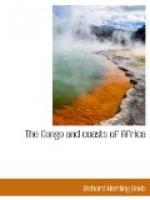The next day, and for days after, we saw nothing but hippos. We saw them floating singly and in family groups, with generally four or five cows to one bull, and sometimes in front a baby hippo no larger than a calf, which the mother with her great bulk would push against the swift current, as you see a tugboat in the lee of a great liner. Once, what I thought was a spit of rocks suddenly tumbled apart and became twenty hippos, piled more or less on top of each other. During that one day, as they floated with the current, enjoying their afternoon’s nap, we saw thirty-four. They impressed me as the most idle, and, therefore, the most aristocratic of animals. They toil not, neither do they spin; they had nothing to do but float in the warm water and the bright sunshine; their only effort was to open their enormous jaws and yawn luxuriously, in the pure content of living, in absolute boredom. They reminded you only of fat gouty old gentlemen, puffing and blowing in the pool at the Warm Springs.
The next chance we had at one of them on shore came on our first evening in the Kasai just before sunset. Captain Jensen was steering for a flat island of sand and grass where he meant to tie up for the night. About fifty yards from the spot for which we were making, was the only tree on the island, and under it with his back to us, and leisurely eating the leaves of the lower branches, exactly as though he were waiting for us by appointment, was a big gray hippo. His back being toward us, we could not aim at his head, and he could not see us. But the Deliverance is not noiseless, and, hearing the paddle-wheel, the hippo turned, saw us, and bolted for the river. The hippopotamus is as much at home in the water as the seal. To get to the water, if he is surprised out of it, and to get under it, if he is alarmed while in it, is instinct. If he does venture ashore, he goes only a few rods from the bank and then only to forage. His home is the river, and he rushes to bury himself in it as naturally as the squirrel makes for a tree. This particular hippo ran for the river as fast as a horse coming at a slow trot. He was a very badly scared hippo. His head was high in the air, his fat sides were shaking, and the one little eye turned toward us was filled with concern. Behind him the yellow sun was setting into the lagoons. On the flat stretch of sand he was the only object, and against the horizon loomed as large as a freight car. That must be why we both missed him. I tried to explain that the reason I missed him was that, never before having seen so large an animal running for his life, I could not watch him do it and look at the gun sights. No one believed that was why I missed him. I did not believe it myself. In any event neither of us hit his head, and he plunged down the bank to freedom, carrying most of the bank with him. But, while we still were violently blaming each other, at about two hundred yards below the boat, he again waddled out of the river and waded




